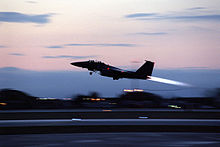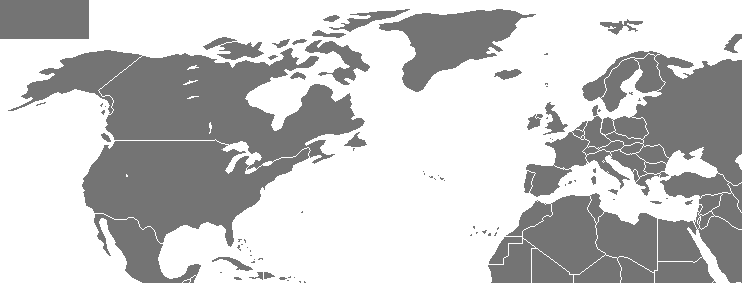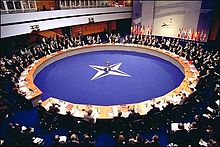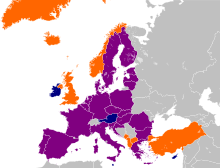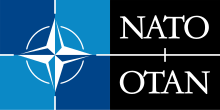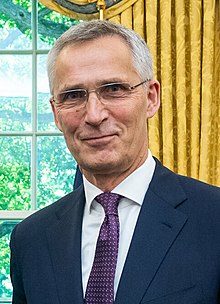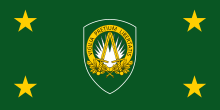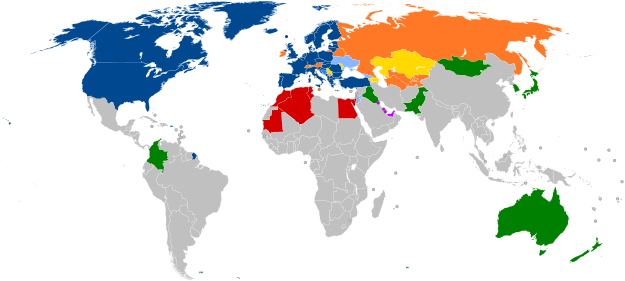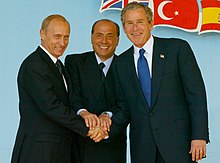NATO
The North Atlantic Treaty Organization (in English, North Atlantic Treaty Organization, NATO; in French, Organization du traité de l'Atlantique nord, NATO), also known as the Atlantic Alliance, is an intergovernmental military alliance governed by the Atlantic Treaty North or Treaty of Washington, signed on April 4, 1949. The organization constitutes a system of collective defense, in which the member States agreed to defend any of its members who are attacked by an external power.
NATO's headquarters are in Brussels, Belgium, and its 30 member states span North America and Europe. The most recent addition is that of North Macedonia, in March 2020. In addition, twenty-one non-member states collaborate with NATO within the Partnership for Peace programme, with another fifteen involved in dialogue programs and nine as global partners. In 2017, the combined military spending of the 30 member countries was 52% of global military spending.
In its early years, NATO was not much more than a political association. However, the Korean War led to the question of a permanent coalition. So a military structure was created under the direction of US commanders. The Cold War led rival nations to create the Warsaw Pact in 1955.
Doubts have always been expressed about the European-American alliance in the face of a Soviet invasion, disagreements that were expressed with the creation by France of the nuclear strike force and with its withdrawal from the military structure of the alliance between 1966 and 2009.
After the fall of the Berlin Wall in 1989, the organization intervened in the war in Yugoslavia, which became NATO's first joint intervention. Politically, the organization has improved its relations with the former members of the Eastern bloc, resulting in the incorporation into NATO of several members of the Warsaw Pact.
The only time a member country invoked Article 5 of the treaty to claim aid in its defense was the United States in 2001. Since then, members have collaborated with the United States in the war in Afghanistan. Article 4 of the treaty provides for calling the members for consultation and has been convened four times, three of them by Turkey, the first for the Iraq war and the remaining two for attacks received during the Syrian civil war, the fourth was invoked by Poland during the 2014 Crimean crisis, due to the mobilization of Russian troops on the Polish border with Kaliningrad and Russian maneuvers in the Baltic Sea.
In 2019, NATO celebrated its 70th anniversary with a summit in London, at the beginning of December, where it signed a joint document highlighting its achievements and for the first time including the influence of China, with the challenges that this means for the organization.
History
Origin of NATO
In 1949, in the aftermath of World War II, the West viewed the expansionist policy that the Soviet Union was following with concern. It was evident that the United Nations Organization would not be able to maintain stability in the world by itself, since the United States' proposals in the Security Council were rejected by numerous Soviet vetoes. The appearance of communist governments in Central and Eastern Europe due to Soviet influence increased the pressure in Western Europe. Between 1947 and 1949, a series of events, made more dramatic by the recent departure of American and Canadian troops still in Europe since the end of World War II, marked the high point in the tension that arose. I was experimenting. These events were threats to the sovereignty of Norway, Greece, Turkey and Czechoslovakia, among others, where the Prague coup in February 1948 was interpreted as a direct attack on European interests. In addition, the blockade of Berlin, between June 1948 and May 1949, worsened the situation for the aforementioned countries.
The need for an association of countries was becoming more evident, so that in March 1948, France, Belgium, the Netherlands, Luxembourg and the United Kingdom signed the Treaty of Brussels, with which they created a military alliance, the Western European Union.
Given the growing socialist expansion, it was decided to create a defensive alliance broader than the Western European Union, for which reason negotiations were held between the United States, Canada and the countries of the Western European Union, which were decided invite Denmark, Iceland, Italy, Norway and Portugal. The negotiations revolved around the creation of a military alliance based on Article 51 of the United Nations Charter, and resulted in the signing of the Washington Treaty on April 4, 1949, by which established the bases for the creation of the North Atlantic Treaty Organization.
One of the difficulties that arose during the negotiations was related to the integration of the United States into the organization. The European countries, devastated after the war, were interested in allying with the United States in order to ensure an effective defense, but this desire was not shared in the United States. However, the coup in Prague and the blockade of Berlin increased the demand on the part of the Europeans, especially France, for the creation of a military alliance with the United States. In secret, an agreement was signed in the United Kingdom, called the Pentagon Paper,[citation needed], which established an outline of how be an alliance in the North Atlantic.
The last element to take into account in the United States integration process involved the need to overcome the difficulty posed by the prohibition by the United States Constitution of militarily allying in times of peace. Senator Vandenberg promoted the vote in the United States Senate of Resolution 239, which on June 11, 1948 gave the green light to the union of the United States to the Atlantic Alliance. At the request of the United States Senate, it was stated in the treaty establishing the alliance (article 5) that the measures to be taken in case of aggression against any member country were the result of the free choice of each country. The Senate thus wanted to maintain the decision-making power of the United States Congress in military matters.
Cold War
In theory, it was intended to be a security guarantee for Western European states against the Soviet Union and its allies. As was typical of the Cold War situation, NATO forces acted as a deterrent.
After the constitution of NATO, new countries were added. In 1952, the first two joined: Greece and Turkey.
In 1954, the Soviet Union proposed joining NATO, with the aim of maintaining peace in Europe, but the allies rejected the proposal. This, together with the addition of West Germany to the organization on 9 May 1955—described as "a defining moment in the history of our continent" by Norwegian Foreign Minister Halvard Lange—had the immediate consequence of creation of the Warsaw Pact, signed on May 14, 1955 by the Soviet Union and its allies. This pact is considered the formal response to NATO, highlighting the two opposing sides of the Cold War.
NATO's unity was already evident from its beginnings. In 1958, French President Charles de Gaulle protested the hegemonic role of the United States in the Organization and what the president understood was a special relationship between the United States and the United Kingdom. In a memorandum sent to US President Eisenhower and British Prime Minister Macmillan on September 17, 1958, de Gaulle argued for the creation of a tripartite leadership, putting France on an equal footing with the United States and the United Kingdom, advocating also by the expansion of NATO in the geographical areas of interest to France, such as Algeria, where France was trying to eliminate the insurgent forces and needed NATO's help.
De Gaulle considered the answers given unsatisfactory, so he decided to build an independent defense for his country. On March 11, 1959, he withdrew his fleet in the Mediterranean from NATO command; three months later, in June 1959, De Gaulle prohibited the entry of nuclear weapons into French territory. This prompted the United States to transfer two hundred aircraft to France and return control, between 1950 and 1967, of the ten largest air bases that had operated in France. The last base returned was Toul-Rosières, the base of the 26th Reconnaissance Wing, transferred to Ramstein airbase in West Germany.
Meanwhile, France had launched its nuclear program, Force de frappe. He tested his first nuclear weapon, Gerboise Bleue, on February 13, 1960 in the Sahara desert.
Although France showed solidarity with the rest of NATO during the Cuban Missile Crisis in 1962, de Gaulle continued his pursuit of an independent defense by removing the French Atlantic and Channel fleet from command. In 1966, the French Armed Forces were withdrawn from NATO's integrated command, and all non-French troops were ordered to leave French territory. All this led to the transfer of the Supreme Headquarters of the Allied Powers in Europe (SHAPE) from Rocquencourt, near Paris, to Casteau, north of Mons, in Belgium, on October 16, 1967. France continued in the alliance and with its help in the defense of Europe against a possible Soviet attack with its troops stationed in West Germany.
On May 30, 1982, Spain signed the Treaty of Washington, becoming the sixteenth member of the Atlantic Alliance. However, after the 1982 general elections, Spanish integration into the organization was suspended, and on March 12, 1986, a referendum was held on Spain's permanence in NATO which, with 52.54% of the votes, was Please remain in the alliance, but not participate in its integrated military structure.
Disintegration of the Eastern Bloc
After the 1989 revolutions and during the process of dissolution of the Soviet Union in 1990-1991, the Warsaw Pact was dissolved on July 1, 1991. NATO reformulated its objectives and activities until it appropriated the security of a part of the northern hemisphere.
In this framework, the first attack operation by NATO in its history was developed, the incursion in 1995 in the Republic of Bosnia and Herzegovina against the Serb forces in what became known as Operation Deliberate Force. In 1999, Operation Allied Force was carried out, the air attack against the Federal Republic of Yugoslavia, aimed at stopping the ethnic cleansing in Kosovo, where crimes were committed against the civilian population.
In 1996, with the authorization of the Congress of Deputies, Spain negotiated its entry into the new NATO command structure, aspiring to "full participation" in the integrated military structure, then in a period of reform. Spain would culminate its incorporation into the integrated military structure on January 1, 1999.
The Czech Republic, Hungary and Poland, former members of the Warsaw Pact, joined the Atlantic Alliance on March 12, 1999.
Faced with the breach of the agreements between Baker-Gorbachev, George F. Kennan, one of the most important figures of United States diplomacy in the context of the Cold War and intellectuals of the 'containment policy'; of communism in 1997, he wrote:
"Why, with all the hopeful possibilities engendered by the end of the Cold War, East-West relations should focus on the question of who would ally with who and, by implication, against who in a fanciful future, totally unpredictable and improbable military conflict? (...) Putting it bluntly... expanding NATO would be the most fateful mistake of U.S. policy in the entire era after the Cold War. It is hoped that such a decision will inflate nationalist, anti-Western and militarist tendencies in Russian opinion; have an adverse effect on the development of Russian democracy; restore the atmosphere of the cold war in East-West relations and promote Russian foreign policy in directions that are definitely not of our liking..."George F. Kennan
A year later, with the imminent ratification by the US Senate on a first round of NATO expansion, in an interview with the New York Times he argued:
“I think it is the beginning of a new cold war. (...) I think the Russians will gradually react quite adversely and affect their policies. I think it's a tragic mistake. There was no reason for this at all. Nobody was threatening anyone else. This expansion would cause the founding fathers of this country to return to their graves. ”George F. Kennan
After 9/11
Following the attacks of September 11, 2001, Operation Enduring Freedom, the US invasion of Afghanistan, took place. NATO activated for the first time the mutual defense mechanism provided for in Article 5 of the Washington Treaty to support United States attacks on Afghanistan.
In Afghanistan, since August 11, 2003, NATO led a UN-mandated mission called the International Security Assistance Force (ISAF). ISAF's objective was to assist the Afghan government in providing effective security throughout the country and in developing its own security forces. Deployed to provide security around Kabul, as the ISAF presence expanded to cover the entire territory, its troops were involved in fighting the insurgency while trying to help rebuild the country.
In Iraq, NATO has limited itself to training security forces. The refusals of numerous European countries to allow NATO to act in the Iraqi conflict, led by Germany, dissuaded this organization from getting involved in a war initiated by the United States and the United Kingdom.
On March 29, 2004, Bulgaria, Slovakia, Slovenia, Romania, and the former Soviet republics of Estonia, Latvia, and Lithuania signed the Washington Treaty.
In February 2005, Gerhard Schröder proposed creating a commission to reform NATO in the face of the growing weight of the European Union. The German chancellor considers it necessary to restructure the Atlantic Alliance, given that the strategic challenges were outside its defensive scope and did not require a military response on the front line, "there have been misunderstandings, discomfort, mistrust and even tensions," the chancellor indicated, as stated reflected in the aftermath of the 2003 invasion of Iraq which revealed how deep the disagreements can be and how unprepared NATO is to react to such difficulties.[citation needed]
In September 2006, NATO launched Operation Medusa in southern Afghanistan, with the aim of wiping out Taliban strongholds in Panjwai and Zhari in Kandahar, where the insurgents had a strong presence. It is estimated that some five hundred Taliban were killed in the operation.
In 2008, NATO requested Colombian Army troops and anti-mine and anti-narcotics experts to participate in the work that was carried out in the Afghan region under the jurisdiction of the Spanish Army, due to their experience in these issues, greater than that of the other countries. On February 20, 2009, the participation of between 120 and 150 members of the Colombian Army in ISAF under the Spanish flag was approved. same time, not being a nation in NATO.
Croatia and Albania joined the Atlantic Alliance on April 1, 2009.
President Nicolas Sarkozy reintegrated France into the integrated command to coincide with the Alliance's 60th anniversary summit on April 3-4, 2009, held between Strasbourg and Kehl on the Franco-German border.
On December 31, 2014, the Atlantic Alliance ended the ISAF mission. Since 2015, NATO has carried out the Resolute Support mission in Afghanistan, with a reduced military presence, to train, advise and assist Afghan forces.
On June 5, 2017, Montenegro, the 29th member of the Alliance, joined.
For its part, North Macedonia became part of the alliance on March 27, 2020. Until then, the country's only obstacle was overcoming the problems derived from the name of the republic, since in 2008 Greece He blocked the invitation to the Slavic country until the dispute over its name, claimed by Greece as Hellenic heritage, was resolved. Thus, in June 2018, both countries signed a provisional agreement by which the Former Yugoslav Republic of Macedonia would be renamed North Macedonia, which was ratified by the parliaments of both countries in January 2019, which allowed the process of joining the alliance to continue, which would culminate a year later.
In 2022, a NATO Summit was held in Madrid, where several points were agreed: a) the increase in troops that member countries make available to the organization; b) that Russia is seen as a direct threat, ceasing to be considered a strategic ally, due to its decisions regarding foreign policy and, especially, the war in Ukraine; c) that China is considered a systematic challenge for its abstentions in the UN Security Council and for its support for Russia in the invasion of Ukraine; and d) that Turkey lifted the veto on the accession of Sweden and Finland to NATO, thus allowing their formal invitation to belong to NATO, breaking their historic neutrality. In addition, this accession would allow NATO to have more kilometers of direct border with Russia.
The North Atlantic Treaty
The treaty shows how it was intended that Europe carry out its own military defense, since in article 3 the United States is allowed to help the military development of Europe, as a Marshall Plan in the military field.
Member States
List of member countries and the date they joined the organization:
Accessions
Article 10 of the North Atlantic Treaty allows new states to join NATO:
The Parties may, by unanimous agreement, invite any European State in a position to promote the development of the principles of this Treaty and to contribute to the security of the North Atlantic zone. Any State thus invited may be a Party to the Treaty by depositing the corresponding instrument of accession with the Government of the United States of America. The Government shall inform each Party that the deposit of such instrument of accession has been made.
This article places two conditions on the entry of new States:
- Only countries in Europe can be new members.
- There is a need for the unanimous agreement of the other member States.
This last criterion implies that Member States can set a series of conditions for the entry of new countries. However, in practice, NATO sets a series of common conditions.
Official applicants
Bosnia and Herzegovina is the only one with a Membership Action Plan. Along with Georgia, they were named "candidate countries" to NATO at the North Atlantic Council meeting on December 7, 2011.
Georgia
Georgia held a referendum on January 5, 2008, in which 72.5% of its population approved the incorporation of this country into the Atlantic Alliance. With the War between Russia and Ukraine in 2022, Fearing a similar case with the Russian giant, Georgia is looking to rapidly accelerate its NATO membership.
Bosnia and Herzegovina
In August 2010, a poll showed that 70% of the country supports NATO membership, but the results were very different in the two constituent entities of Bosnia and Herzegovina. While 90% of the Federation of Bosnia and Herzegovina (a Bosniac-majority region) supported NATO membership, only 33% in the Serb-majority Republika Srpska did.
Sweden and Finland
Although neither Sweden nor Finland are part of NATO, both participate in their exercises and, following the first phase of the Russian-Ukrainian war in 2014, there were in both countries internal debates, inviting them to reconsider their neutrality and join the organization.
In 2022, with the invasion of Russia to Ukraine, and due to the threats of war by the Russian government against the two countries of the North of Europe if they join NATO, the population of Sweden and Finland, in addition to their governments, have favourably sought to address the accession of their countries to the transatlantic organization at the summit of Madrid in 2022. It seems Turkey would present some opposition to its rapid income. While some NATO members welcomed the membership of Finland and Sweden in NATO, Turkey was also negatively received. In Turkey, he accuses Finland and Sweden of supporting the followers of PKK, YPG and Fethullah Gülen. PKK is a terrorist organization recognized by Turkey, the European Union and the United States. Turkey accuses the followers of Fethullah Gülen of the failed attempted Turkish military coup of 2016.
Finland and Sweden — both neutral and members of the European Union — increased their cooperation with NATO when Russia began its invasion of Ukraine and attended a special NATO format meeting, and together condemned the invasion and provided assistance to Ukraine. Both Finnish and Swedish public opinion in favour of joining NATO after the invasion. A public petition calling on the Parliament of Finland to hold a referendum to join NATO reached the required 50,000 signatures, leading to a parliamentary debate. Since then, both countries analysed their entry to the agency, which they confirmed in May 2022.Other applicants
Ukraine
Ukraine began its accession process in January 2008, when the application for membership in the alliance was presented in Brussels, which must be supported through a popular referendum, on a date that has not yet been established.
On June 8, 2017, Ukraine's Verkhovna Rada passed a law making NATO integration a foreign policy priority. In July 2017, Poroshenko announced that he would seek to open negotiations on a Membership Action Plan with NATO.
By March 2018, NATO had recognized Ukraine as a candidate country. On September 20, 2018, the Ukrainian parliament approved amendments to the constitution that would make the country's accession to NATO and the EU a central objective and the main goal of foreign policy.
In 2022, after the war between Russia and Ukraine, the latter and NATO have redoubled efforts so that the country quickly adheres to the transatlantic organization, taking into account that NATO has been providing logistical and weapons support to Ukraine, calling it an "invasion" Russian aggression.
Structure and organization
Political Structure
North Atlantic Council
NATO is governed by its thirty member states, however the North Atlantic Treaty and other agreements outline how decisions within NATO should be made.
Each of the thirty members sends a delegation to NATO headquarters in Brussels. The senior permanent member of each delegation is known as the "permanent representative", who is usually an experienced senior official or ambassador. The permanent members form the North Atlantic Council (North Atlantic Council, NAC), which meets at least once a week and has effective governing authority and decision-making power in NATO. The most important decisions are taken in meetings made up of the Ministers of Foreign Affairs, Defense Ministers or Heads of State or Government.
Meetings of the North Atlantic Council are chaired by the NATO Secretary General. All decisions are made unanimously and by mutual agreement. There is no voting or decision by majority. Each nation represented at the Council table or on any of its subordinate committees retains complete sovereignty and responsibility for its own decisions.
General Secretary
The Secretary General is the President of the North Atlantic Council, the highest representative of the political leadership of the North Atlantic Treaty Organization. Since the creation of NATO, the Secretaries General have been:
Since October 2019, the Deputy Secretary General of NATO is the Romanian Mircea Geoană.
NATO Parliamentary Assembly
NATO's Parliamentary Assembly sets NATO's many strategic goals. It meets in the Annual Session, and is the body that interacts directly with the parliamentary structures of the national governments of the member states through their permanent members or ambassadors to NATO. The NATO Parliamentary Assembly consists of the legislators of the member countries of the North Atlantic Alliance, as well as thirteen associate members. They are intended to discuss security policies in the NATO Council.
The Assembly is NATO's political integration body that sets the political agenda of the NATO Council through reports from its five committees:
- Committee on the Civil Dimension of Security.
- Security and Defence Committee.
- Economic and Security Commission.
- Political Commission.
- Committee on Science and Technology.
Military Structure
Military Committee
NATO's military structure is directed by the Military Committee, which in turn is under the authority of the North Atlantic Council. The Committee is in charge of advising the Alliance on military matters, being able to meet for this the chiefs of staff, being more common the meeting at the level of military representatives.
The Chairman of the Military Committee is the highest-ranking military officer in NATO, and the chief military adviser to the Secretary General.
The Military Committee, fulfilling its objective of advising on military matters, gives guidelines to the organization's two strategic commanders: the Supreme Allied Commander in Europe (Supreme Allied Commander Europe, SACEUR) and the Supreme Allied Commander Transformation (SACT).
Allied Operations Command
The function of SACEUR is to preserve the peace, security and territorial integrity of all the countries that make up NATO. The SACEUR, as Supreme Commander, will be in charge of repelling, through the appropriate military measures, any attack that occurs or is at risk of occurring.
It is also in charge of planning military campaigns, including the recruitment of the military forces necessary to carry out NATO missions, which include promoting stability, aiding in crisis and providing effective defense wherever necessary.. On the other hand, it is in charge of making the pertinent recommendations to the political and military authorities regarding any military matter that is within its responsibility. The SACEUR also has direct access to the military representatives of each country, as well as, if it finds it necessary, with the pertinent authorities, to facilitate the fulfillment of the missions.
SACEUR has a very important public profile, being the spokesperson for the Supreme Headquarters of the Allied Powers in Europe (Supreme Headquarters Allied Powers in Europe, SHAPE). Through his and his cabinet staff's public acts, he maintains regular contact with the press and travels to NATO member countries, as well as those with which he is conducting dialogue, cooperation and association. SACEUR is also responsible for developing military contacts with the countries belonging to the Partnership for Peace programme.
SHAPE is the military command center of SACEUR. Until 1967, it was located in France, in Rocquencourt, at the current headquarters of the Institut National de Recherche en Informatique et en Automatique, near Paris. Following the withdrawal of France from the NATO military structure, SHAPE was transferred to Belgium, in the territory of the former communes of Casteau, Maisières and Masnuy-Saint-Jean. After the merger of the communes, the entire territory of SHAPE became part of Mons, in the province of Hainaut.
List of Supreme Allied Commanders in Europe:
| Name | Army | From | |
|---|---|---|---|
| 1. | Army General Dwight D. Eisenhower | United States Army | 2 April 1951 |
| 2. | General Matthew Ridgway | United States Army | 30 May 1952 |
| 3. | General Alfred Gruenther | United States Army | 11 July 1953 |
| 4. | General Lauris Norstad | United States Air Force | 20 November 1956 |
| 5. | General Lyman Lemnitzer | United States Army | 1 January 1963 |
| 6. | General Andrew Goodpaster | United States Army | 1 July 1969 |
| 7. | General Alexander Haig | United States Army | 15 December 1974 |
| 8. | General Bernard W. Rogers | United States Army | 1 July 1979 |
| 9. | General John Galvin | United States Army | 26 June 1987 |
| 10. | General John Shalikashvili | United States Army | 23 June 1992 |
| 11. | General George Joulwan | United States Army | 22 October 1993 |
| 12. | General Wesley Clark | United States Army | 11 July 1997 |
| 13. | General Joseph Ralston | United States Air Force | 3 May 2000 |
| 14. | General James L. Jones | United States Marine Corps | 17 January 2003 |
| 15. | General Bantz J. Craddock | United States Army | 7 December 2006 |
| 16. | General James G. Stavridis | United States Navy | 2 July 2009 |
| 17. | General Philip M. Breedlove | United States Air Force | 13 May 2013 |
| 18. | General Curtis Scaparrotti | United States Army | 4 May 2016 |
| 19. | General Tod D. Wolters | United States Air Force | May 3, 2019 |
The Allied Operations Command is made up of various headquarters subordinate to SHAPE: At the operational level by two joint force commands, one in Brunssum (Netherlands) and another in Naples (Italy). At the tactical level by the Allied Air Command Headquarters in Ramstein (Germany), the Allied Land Command Headquarters in Izmir (Turkey) and the Allied Maritime Command Headquarters in Northwood (United Kingdom).
Allied Transformation Command
Since its creation in 2003, the mission of the Allied Transformation Command is to contribute to preserving the peace, security and territorial integrity of the member states of the Alliance by leading the transformation of military structures, forces, capabilities and doctrines. This mission must allow NATO to fulfill its main objectives and missions.
The Transformation Allied Command is organized around four main functions:
- Strategic thinking.
- Capacity-building.
- Education, training and exercises.
- Cooperation and commitment.
It is headquartered in Norfolk, Virginia, United States, and has three subordinate entities: The Joint Warfare Center (Stavanger, Norway), the Joint Forces Training Center (Bydgoszcz, Poland), and the Center for Joint Analysis and Lessons Learned (Monsanto, Portugal).
Since September 11, 2018, SACT, Supreme Allied Commander of Transformation, is General André Lanata of the French Air Force.
Agreements with other countries not members of the Alliance
Individual Association Action Plans
In November 2002, during the Prague summit, Individual Partnership Action Plans (IPAPs) were opened to countries that have the political will and sufficient capacity to have a closer relationship with NATO. IPAPs have been implemented in the following countries:
- Ukraine (22 November 2002)
- Georgia (29 October 2004)
- Azerbaijan (27 May 2005)
- Armenia (16 December 2005)
- Kazakhstan (31 January 2006)
- Moldova (19 May 2006)
- Bosnia and Herzegovina (September 2008)
- Serbia (15 January 2015)
Partnership for Peace
The Partnership for Peace (PfP) is a program originally launched in 1994 and based on bilateral relations between each partner country and NATO: each country can choose to what extent you want to participate.
The twenty-one partner countries are:
- Former countries of the Soviet Union: Armenia, Azerbaijan, Belarus, Georgia, Kazakhstan, Kyrgyzstan, Moldova, Russia, Tajikistan, Turkmenistan, Ukraine, Uzbekistan.
- Militaryly neutral countries that had a capitalist system during the Cold War: Austria, Finland, Ireland, Malta, Sweden, Switzerland.
- Militaryly neutral countries that had a socialist economy during the Cold War: Bosnia and Herzegovina, Serbia.
Cyprus encounters strong opposition to its admission into the Partnership for Peace from Turkey because of the conflict between the two countries. For this reason, Cyprus does not participate in the European Security and Defense Policy.
The Euro-Atlantic Partnership Council (EAPC), established on 29 May 1997, is a forum for coordination, consultation and dialogue between the participants of the Partnership for Peace program and the NATO member countries.
NATO-Russia Council
Since the mid-2000s, Russia has been protesting US plans to install ten anti-missile interceptors in Poland and one radar in the Czech Republic aimed at preventing hypothetical attacks from Iran and North Korea. opinion of Russian Foreign Minister Sergei Lavrov in April 2007,[citation needed] the defense system does not offer protection to Romania, Bulgaria, Greece and Turkey, that could be hit by missiles from Iran, Russia interpreting its construction as "the advance of NATO's military infrastructure towards our borders".[citation needed] Before the According to the arguments of Condoleezza Rice, the US Secretary of State, Lavrov is not convinced, a reaction that creates some concern among some NATO countries, such as Germany and Norway.
However, it is since the beginning of March 2014 when relations between NATO and the Russian Federation deteriorate significantly, due to the crisis in Ukraine and the Russian annexation of Crimea, NATO asking Russia to stop its actions and publicly affirming its support for the sovereignty and territorial integrity of Ukraine. Thus, on April 1, 2014, NATO issues a statement announcing that it has "decided to suspend all civil and military cooperation between NATO and Russia. The political dialogue in the NATO-Russia Council can continue at the ambassadorial level to be able to exchange points of view, especially regarding this crisis." In addition, the statement condemns "the illegal Russian military intervention in Ukraine and the violation of the sovereignty and territorial integrity of Ukraine by Russia".
Global Partners
Being a global partner of NATO does not mean being a member of the organization, but has cooperation privileges on the part of the member countries of the alliance in the area of equipment, training and research towards the countries that make up this group as if they were members.
In this "global partner" category are Afghanistan, Australia, Iraq, Japan, Colombia, South Korea, Mongolia, New Zealand and Pakistan.
Columbia
In June 2013, the Government of Colombia signed a cooperation and rapprochement agreement with the transatlantic organization, with the aim of making the country an associate member in the future.
On May 25, 2018, then-Colombian President Juan Manuel Santos declared via Twitter that Colombia will join NATO the following week as a "global partner" (global partner), becoming a the first country in Latin America associated with the organization, entry completed on May 31.
Major non-NATO ally
A major non-NATO ally (in English, Major non-NATO ally; or its acronym MNNA) is a designation given by the United States government to a group of allied countries that maintain a joint work with the Armed Forces of the United States, but are not members of the organization. Being elevated to MNNA status does not automatically include a collective defense pact with the United States, but it does provide military and financial advantages, on the part of the United States, that could not be obtained by non-NATO members.
List of MNNAs
In parentheses, the year in which they were declared in this category:
 Australia (1989)
Australia (1989)- South Korea
 South Korea (1989)
South Korea (1989) - Egypt
 Egypt (1989)
Egypt (1989) - Israel
 Israel (1989)
Israel (1989) - Japan
 Japan (1989)
Japan (1989) - Jordan
 Jordan (1996)
Jordan (1996) - New Zealand
 New Zealand (1997)
New Zealand (1997)  Argentina (1998)
Argentina (1998)- Baréin
 Baréin (2002)
Baréin (2002) - Philippines
 Philippines (2003)
Philippines (2003)  Thailand (2003)
Thailand (2003) Republic of China (2003)
Republic of China (2003)- Kuwait
 Kuwait (2004)
Kuwait (2004) - Morocco
 Morocco (2004)
Morocco (2004) - Pakistan
 Pakistan (2004)
Pakistan (2004) - Afghanistan
 Afghanistan (2012)
Afghanistan (2012) - Tunisia
 Tunisia (2015)
Tunisia (2015)
Criticism
NATO has been widely criticized for its military actions and measures by multiple quarters such as UK and French Foreign Ministers William Hague and Alain Juppé during NATO operations in Libya. UNESCO accused him of violating United Nations resolutions and the Geneva conventions that condemn violence against journalists and the media by bombing Libyan state television facilities. During this same period, then-Venezuelan Foreign Minister Nicolás Maduro, speaking from the United Nations General Assembly, hinted with his speech that NATO supported a group of rebels to overthrow Muammar Gaddafi with the sole objective of seizing Libya's valuable natural resources.
He received criticism from the Russian Foreign Minister, Sergei Lavrov, due to the way in which he faced the war in Mali, Syria and his actions against the Iranian nuclear program; "The way in which NATO deals with the problems does not help," said the Russian minister, adding that the international community should "adopt a more global approach", not focused on the exclusive interests of Europe and the United States - the alliance transatlantic—and that the risks are shared. Lavrov questioned the way in which NATO is dealing with the "main problems of today", such as the Arab spring, Syria, Mali or Iran.
The question of Ceuta, Melilla and other territories in NATO
There has been a debate about the fact that, in relation to Ceuta and Melilla, NATO would supposedly not be obliged to defend Spanish sovereignty through article 5 from a possible foreign military attack (presumably Moroccan) in a strict reading of the territorial limits of article 6 of the Treaty, for reasons of geographical limits (for example, the US territory of Hawaii would not be covered either). This does not prevent Spain's entry into NATO from having undoubtedly dissuasive effects, according to Solsten and Meditz. However, the cities would be indirectly covered by the second paragraph of article 6: "it will be considered armed attack against one or several of the Parties, which occurs [...] against the forces, ships or aircraft of any of the Parties [...] that are in the Mediterranean Sea [...]" (that is, for example, that literally following this article, an attack on a Spanish Navy ship anchored in the port of Ceuta or Melilla would give rise to requesting the application of article 5) and also Spain could request help based on article 4: "The Parties shall consult when, in the opinion of any of them, the territorial integrity, political independence or security of any of the Parties is threatened". With the new NATO Strategic Concept (SC) approved in Lisbon in 2010, it was signaled that "NATO will deter and defend against any threat of aggression, and against emerging risks where they call into question the fundamental security of either individual Allies or the Alliance as a whole" and does not take geographical limits into account (the 1999 Strategic Concept did include the geographical limits indicated in Article 6 of the Treaty). In fact, then NATO Secretary General Anders Fogh Rasmussen said: "But today, the defense of our territory and our citizens does not begin or end at the border. You can start in Kandahar. You can start in cyberspace. And NATO needs to be able to defend itself across the spectrum."
During the 1982 Falklands War, the UK did not officially request NATO support because the war was in the southern hemisphere; however, it received help from its NATO allies. NATO supported Spain during the Perejil Island incident. The protection of Ceuta and Melilla has also been reinforced by article 42.7 of the European Union TUE which states: "If a Member State is the object of an armed aggression on its territory, the other Member States must help and assist it with all means at their disposal, in accordance with Article 51 of the Charter of the United Nations. This is without prejudice to the specific nature of the security and defense policy of certain Member States."
With the new strategic concept that emerged after the Madrid Summit in 2022, it is pointed out that "although NATO is a defensive Alliance, no one should doubt our strength and determination to defend every inch of allied territory, preserve the sovereignty and territorial integrity of all allies and to prevail against any aggressor", Secretary General Jens Stoltenberg assured that "on Ceuta and Melilla, NATO is here to protect the allies against any threat. After all, there will always be a political decision to invoke Article 5, but NATO is here to defend and protect all our allies", and presidents like the American Joe Biden or the British Boris Johnson made more or less explicit statements to the same effect.
Defense spending
The estimated investment in defense in 2021 of each country is the following:
| Country | Expenditure in defence (millions of dollars) | Expenditure in defence (% of GDP) |
|---|---|---|
| Albania | 241 | 1.41 % |
| Germany | 63 339 | 1.49 % |
| Belgium | 6400 | 1.07 % |
| Bulgaria | 1282 | 1.62 % |
| Canada | 26 919 | 1.36 % |
| Croatia | 1445 | 2.16 % |
| Denmark | 4376 | 1.40 % |
| Slovakia | 1320 | 1.73 % |
| Slovenia | 567 | 1.22 % |
| Spain | 14 581 | 1.03 % |
| 811 140 | 3.57 % | |
| Estonia | 771 | 2.16 % |
| 52 025 | 1.93 % | |
| Greece | 7758 | 3.59 % |
| Hungary | 3140 | 1.69 % |
| Italy | 32 719 | 1.54 % |
| Latvia | 835 | 2.16 % |
| Lithuania | 1318 | 2.03 % |
| Luxembourg | 462 | 0.54% |
| Montenegro | 92 | 1.63 % |
| Norway | 8234 | 1.74 % |
| Netherlands | 14 690 | 1.45 % |
| Poland | 15 401 | 2.34 % |
| 3920 | 1.55 % | |
| United Kingdom | 72 706 | 2.25 % |
| Czech Republic | 3972 | 1.40 % |
| Romania | 5348 | 1.88 % |
| Turkey | 13 014 | 1.60 % |
| Total | 1 175 332 |
At the 2014 Newport Summit, member countries agreed as a goal to increase their defense spending to a minimum of 2% of their GDP by 2024.
Further reading
- Beginning
- Beer, Francis A. Integration and Disintegration in NATO: Processes of Alliance Cohesion and Prospects for Atlantic Community. Columbus: Ohio State University Press, 1969, 330 pp.
- Beer, Francis A. The Political Economy of Alliances: Benefits, Costs, and Institutions in NATO. Beverly Hills: Sage, 1972, 40 pp.
- Eisenhower, Dwight D. The Papers of Dwight David Eisenhower. Vols. 12 and 13: NATO and the Campaign of 1952: Louis Galambos et al., ed. Johns Hopkins University Press, 1989. 1707 pp. in 2 vol.
- Gearson, John and Schake, Kori, ed. The Berlin Wall Crisis: Perspectives on Cold War Alliances Palgrave Macmillan, 2002. 209 pp.
- Milloy, John C. North Atlantic Treaty Organisation, 1948–1957: Community or Alliance? (2006), (focused on non-military matters).
- Smith, Joseph, ed. The Origins of NATO Exeter, University of Exeter Press, 1990. 173 pp.
- Cold War
- Smith, Jean Edward and Canby, Steven L. The Evolution of NATO with Four Plausible Threat Scenarios. Canada Department of Defence: Ottawa, 1987. 117 pp.
- After the Cold War
- Asmus, Ronald D. Opening NATO's Door: How the Alliance Remade Itself for a New Era Columbia University Press, 2002. 372 pp.
- Bacevich, Andrew J. and Cohen, Eliot A. War over Kosovo: Politics and Strategy in a Global Age. Columbia University Press, 2002. 223 pp.
- Caracuel Raya, Maria Angustias. NATO changes after the end of the cold war, Tecnos, Madrid, 2004.
- Daclon, Corrado Maria Security through Science: Interview with Jean Fournet, Assistant Secretary General of NATO, Analisi Difesa, 2004. No. 42.
- Gheciu, Alexandra. NATO in the 'New Europe' Stanford University Press, 2005. 345 pp.
- Hendrickson, Ryan C. Diplomacy and War at NATO: The Secretary General and Military Action After the Cold War University of Missouri Press, 2006. 175 pp.
- Lambeth, Benjamin S. NATO's Air War in Kosovo: A Strategic and Operational Assessment Santa Monica, Calif.: RAND, 2001. 250 pp.
- General Stories
- Alasdair, Roberts (2002/2003). "NATO, Secrecy, and the Right to Information." East European Constitutional Review (New York University — School of Law). 11/12 (4/1): 86-94. Archived from the original on 13 September 2006.
- Kaplan, Lawrence S. The Long Entanglement: NATO's First Fifty Years. Praeger, 1999. 262 pp.
- Kaplan, Lawrence S. NATO Divided, NATO United: The Evolution of an Alliance. Praeger, 2004. 165 pp.
- Létourneau, Paul. Le Canada et l'OTAN après 40 ans, 1949–1989 Quebec: Cen. Quebec of Relations Int., 1992. 217 pp.
- Paquette, Laure. NATO and Eastern Europe After 2000 (New York: Nova Science, 2001).
- Powaski, Ronald E. The Entangling Alliance: The United States and European Security, 1950–1993. Greenwood Publishing Group, 1994. 261 pp.
- Telo, António José. Portugal and NATO: O Reencontro da Tradiçoa Atlântica. Lisbon: Cosmos, 1996. 374 pp.
- Sandler, Todd and Hartley, Keith. The Political Economy of NATO: Past, Present, and into the 21st Century. Cambridge University Press, 1999. 292 pp.
- Zorgbibe, Charles. Histoire de l'OTAN. Brussels: Complexe, 2002. 283 pp.
- Other conflicts
- Kaplan, Lawrence S., ed. American Historians and the Atlantic Alliance. Kent State University Press, 1991. 192 pp.
Contenido relacionado
Annex: Soccer at the Moscow Olympic Games 1980
Millikan's experiment
Squad 201




